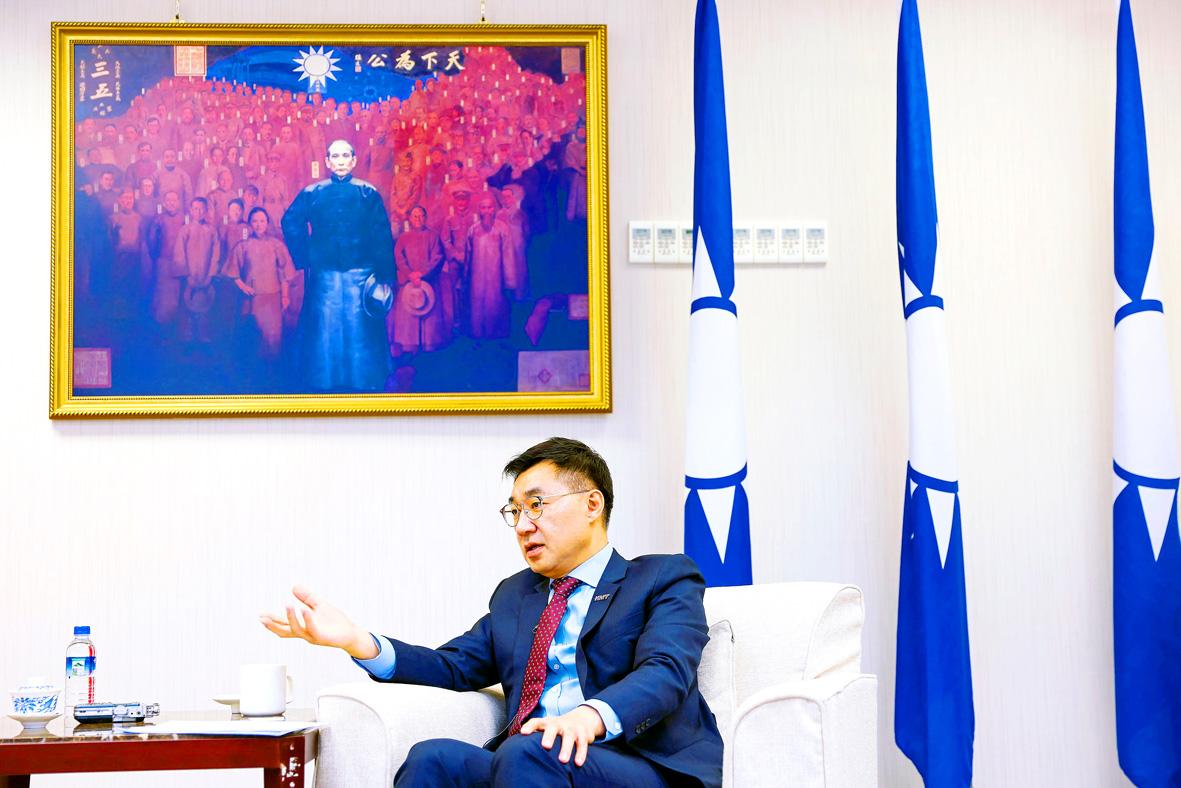Chinese Nationalist Party (KMT) Chairman Johnny Chiang (江啟臣) yesterday said that he is in no rush to travel to China to meet Chinese President Xi Jinping (習近平), and that Beijing’s proposals to get Taiwan to accept communist rule have “no market” among Taiwanese.
Since the KMT was trounced in the presidential and legislative elections in January last year, the party has been unable to shake accusations by the Democratic Progressive Party (DPP) that it is Beijing’s lackey.
Chiang, elected as party leader following the defeat, told reporters that he is in no hurry to follow his predecessors footsteps and meet Xi.

Photo: Ann Wang, Reuters
“We can wait for a better time. There’s no urgency for it. It’s not just a meeting for a meeting’s sake, but it needs to be meaningful, respectful,” he said at the party’s headquarters in Taipei, adding that the COVID-19 pandemic has also made it difficult to travel outside of Taiwan.
“The timing needs to be right, but more importantly, there needs to be the precondition of equality and dignity, and it needs to be beneficial for Taiwan,” Chiang said.
The KMT maintains routine contact with the Chinese Communist Party (CPP), but there has been no high-level communication, Chiang said.
In Singapore in 2015, Xi met then-president Ma Ying-jeou (馬英九) in a landmark meeting, shortly before President Tsai Ing-wen (蔡英文) was elected the following year. That meeting was cast as a meeting between the heads of the CCP and the KMT, rather than one between heads of state.
However, political trust has “collapsed” since then, with small issues turning into angry quarrels between Taipei and Beijing, Chiang said.
He faces an uphill struggle to win back voter support at a time when Chinese pressure on Taiwan is unrelenting and many electors view the KMT as not properly Taiwanese.
In July, he faces re-election as party chairman, although he reiterated that he has no interest in running for president and would rather serve as a “kingmaker” by choosing the party’s presidential candidate for the election in 2024.
Being firm with autocratic China would be an important test of whether the KMT can return to power — Chiang described China as the major threat that Taiwan faces.
Chiang said that China’s offer of using “one country, two systems” to entice Taiwan with a high degree of autonomy, like how Beijing is supposed to run Hong Kong, has “no market” in Taiwan, where the people like their freedoms.
“We are already used to this kind of lifestyle. If you want Taiwan’s people to change it — impossible,” he said.

China might accelerate its strategic actions toward Taiwan, the South China Sea and across the first island chain, after the US officially entered a military conflict with Iran, as Beijing would perceive Washington as incapable of fighting a two-front war, a military expert said yesterday. The US’ ongoing conflict with Iran is not merely an act of retaliation or a “delaying tactic,” but a strategic military campaign aimed at dismantling Tehran’s nuclear capabilities and reshaping the regional order in the Middle East, said National Defense University distinguished adjunct lecturer Holmes Liao (廖宏祥), former McDonnell Douglas Aerospace representative in Taiwan. If

Prosecutors in New Taipei City yesterday indicted 31 individuals affiliated with the Chinese Nationalist Party (KMT) for allegedly forging thousands of signatures in recall campaigns targeting three Democratic Progressive Party (DPP) lawmakers. The indictments stem from investigations launched earlier this year after DPP lawmakers Su Chiao-hui (蘇巧慧) and Lee Kuen-cheng (李坤城) filed criminal complaints accusing campaign organizers of submitting false signatures in recall petitions against them. According to the New Taipei District Prosecutors Office, a total of 2,566 forged recall proposal forms in the initial proposer petition were found during the probe. Among those

ECHOVIRUS 11: The rate of enterovirus infections in northern Taiwan increased last week, with a four-year-old girl developing acute flaccid paralysis, the CDC said Two imported cases of chikungunya fever were reported last week, raising the total this year to 13 cases — the most for the same period in 18 years, the Centers for Disease Control (CDC) said yesterday. The two cases were a Taiwanese and a foreign national who both arrived from Indonesia, CDC Epidemic Intelligence Center Deputy Director Lee Chia-lin (李佳琳) said. The 13 cases reported this year are the most for the same period since chikungunya was added to the list of notifiable communicable diseases in October 2007, she said, adding that all the cases this year were imported, including 11 from

The Ma-anshan Nuclear Power Plant’s license has expired and it cannot simply be restarted, the Executive Yuan said today, ahead of national debates on the nuclear power referendum. The No. 2 reactor at the Ma-anshan Nuclear Power Plant in Pingtung County was disconnected from the nation’s power grid and completely shut down on May 17, the day its license expired. The government would prioritize people’s safety and conduct necessary evaluations and checks if there is a need to extend the service life of the reactor, Executive Yuan spokeswoman Michelle Lee (李慧芝) told a news conference. Lee said that the referendum would read: “Do